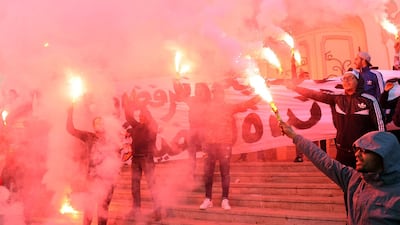The thousands of protesters who spilled onto Tunisian streets eight years ago could not have known that they were starting a wave of events that would reshape the Arab world. On December 7, 2010, leaked cables from the US ambassador to Tunis laid bare the tensions in a “police state” riddled with “corruption ... high unemployment and regional inequities”. Ten days later, street vendor Mohamed Bouazizi set himself on fire in protest at his humiliation by a government official and in death became the figurehead of an irresistible drive for change. Within a few weeks, President Zine El Abidine Ben Ali, who had ossified in power for 24 years, fled to Saudi Arabia where he still lives today, unable to involve himself in the nation's politics.
With the region still dealing with the consequences of the uprisings, from Egypt and Syria to Yemen and Libya, it is too early to pass final judgment. But within Tunisia, a repressive regime was toppled and democracy was born.
As the Iraq experience has shown, it is naive to expect the overnight transformation of any country emerging from decades of oppression. Nevertheless, Tunisia has achieved much over the past eight years, not least by exorcising its ghosts through the Truth and Dignity Commission. Some have rightly been held accountable for the mistakes of the previous regime, but the majority of civil servants retained their positions, ensuring continuity and stability.
So, while the transition has not been entirely smooth, a bumpy road does not necessarily head in the wrong direction. Tunis is now governed by its first female mayor, while the country has successfully reinvented itself as a multi-party republic with free and fair elections and a new constitution.
Extremism, nevertheless, continues to pose a challenge to the country, whose vital tourist industry is yet to fully recover from attacks on foreigners that killed 60 in 2015. About 2,900 Tunisians left to join ISIS, making it one of the group's largest breeding grounds, and in October a suicide bomber injured nine in Tunis. With nine prime ministers in seven years and an uneasy alliance in power for the past four, Tunisia has struggled to achieve sufficient political stability to tackle its deep economic malaise. Punishing IMF-approved reforms have been met with resistance by unions, and in October these tensions ended the alliance between the secular Nidaa Tounes party and the Islamist Ennahda party. A new political force, the National Alliance, is emerging, rallying behind the reformist prime minister Youssef Chahed.
Inevitably, there is concern that the collapse of the alliance might paralyse Tunisia's bold reforms. Regardless, the transition to a pluralistic society remains on track. And nationwide elections scheduled for late next year will offer the electorate an opportunity to break the political stalemate, maintain Tunisia's momentum and ensure that the sacrifices of 2011 were not made in vain.

